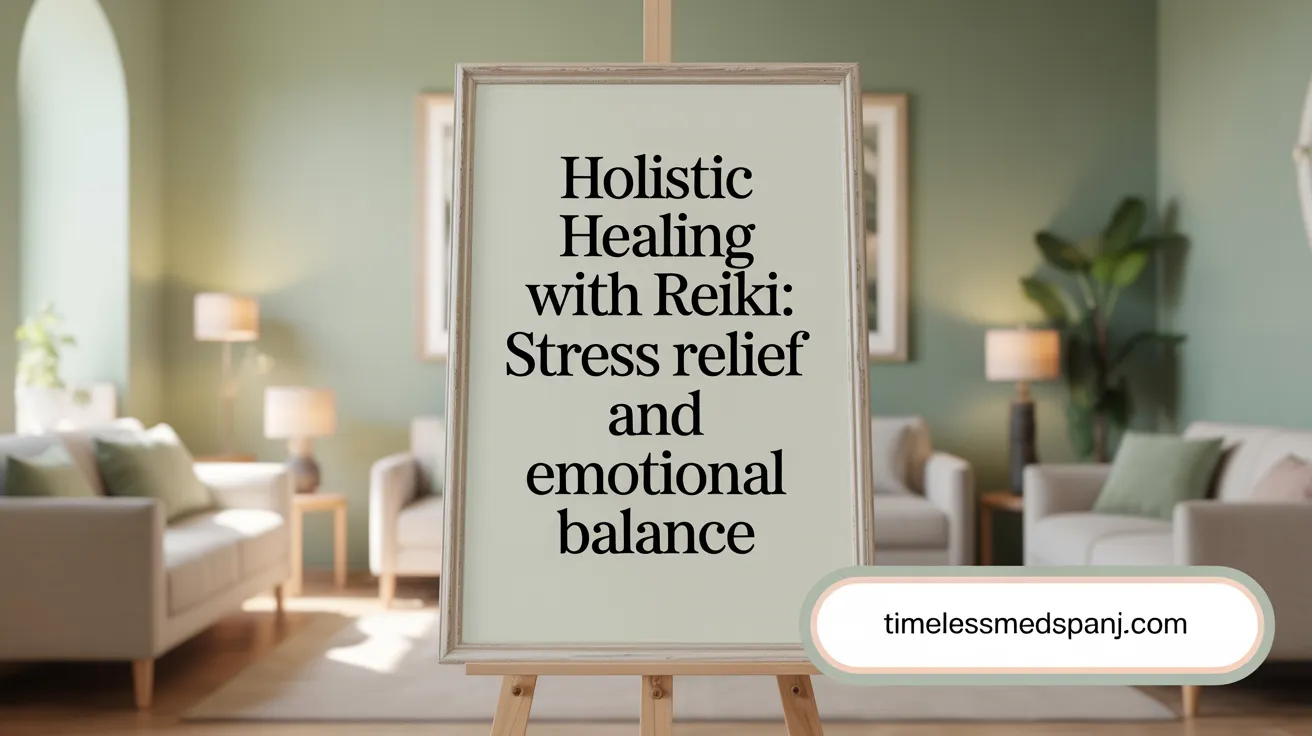Understanding Reiki as a Holistic Healing Modality
Reiki therapy, rooted in ancient Japanese healing traditions, offers a unique approach to health and wellness by channeling universal life force energy to promote balance within the body. This complementary therapy has gained popularity for its potential to relieve stress, encourage emotional healing, and enhance physical well-being — including notable effects on skin health. As holistic wellness continues to gain traction, exploring Reiki's principles, benefits, and integration with skincare provides valuable insights for those seeking natural pathways to glowing skin and improved overall health.
The Foundations of Reiki Therapy: Principles and Mechanisms

Origins and philosophy of Reiki
Reiki is a holistic healing practice that originated in Japan in the early 20th century. Developed by Mikao Usui, it is rooted in the belief that a universal life force energy, often called 'Ki,' flows through all living beings. According to Reiki philosophy, this energy sustains health and well-being, and disruptions or blockages in its flow can lead to stress, emotional turmoil, or physical illness. Practitioners hold that by channeling this energy, they can promote balance, healing, and spiritual growth (How Reiki Works).
Concept of universal life force energy
A core idea in Reiki is the existence of a universal, all-pervading energy that supports life. This concept aligns with similar ideas in cultures worldwide, such as 'qi' in Chinese medicine or 'prana' in Indian traditions (Qi and prana concepts). Although these concepts lack scientific proof, they are widely embraced within spiritual and holistic health communities. Reiki practitioners believe that this energy can be accessed and directed to stimulate the body's natural healing responses (Reiki Energy Healing).
Mechanisms of energy transfer
During a Reiki session, the practitioner gently places their hands on or just above the client's body in specific positions (Energy healing hand placements). Sometimes, hands may hover without contact. The intent is to transfer 'Ki' to the recipient, encouraging the flow of energy along pathways called meridians. Many recipients report sensations like warmth, tingling, or a sense of calm, which are thought to indicate successful energy transfer (Reiki Sensations During Healing). This process is believed to promote emotional relaxation, reduce tension, and support physical healing (Reiki relaxation effects).
Impact on autonomic nervous system and stress reduction
Scientific interest has explored how Reiki might influence physiological processes. Some studies suggest that Reiki activates the parasympathetic branch of the autonomic nervous system, responsible for relaxation and recovery (Reiki activates parasympathetic nervous system). By decreasing stress hormones such as cortisol and enhancing heart rate variability, Reiki can foster a deep state of relaxation (Reiki reduces heart rate and blood pressure). This relaxation response may help lower blood pressure, reduce pain, and alleviate anxiety, ultimately supporting overall health (Reiki reduces anxiety and depression).
Role as a complementary holistic therapy
While scientific explanations of energy transfer remain unproven, Reiki is widely used as a non-invasive, complementary approach alongside conventional medicine. It is considered safe and can enhance emotional and physical well-being (Reiki safety and precautions). Many patients and practitioners view Reiki as a tool for promoting balance within the energetic body, which in turn supports the body's innate capacity to heal (Reiki as adjunct therapy). As ongoing research aims to validate and understand its mechanisms, Reiki continues to be valued in holistic health and integrative medicine settings (Evidence-based medical care recommendations).
Reiki's Holistic Benefits: Stress Reduction and Emotional Healing

How does Reiki therapy contribute to holistic effects such as stress reduction, mental health benefits, and emotional healing related to physical wellness?
Reiki therapy offers a gentle yet profound way to promote overall well-being by focusing on the body's energy balance. When performed, Reiki involves hand placements or hovering hands that encourage the flow of universal life force energy, which many believe supports emotional and physical health. While the scientific basis of this energy remains unproven, the practice is widely recognized for its ability to induce deep relaxation.
A significant aspect of Reiki's effect is its stimulation of the parasympathetic nervous system, often called the 'rest-and-digest' system. Activation of this system lowers heart rate, reduces blood pressure, and calms the nervous system, which can help alleviate stress and tension (Reiki activates parasympathetic nervous system). Patients frequently report feelings of calm, warmth, and emotional relief during and after sessions.
In terms of mental health, Reiki helps diminish symptoms of anxiety, depression, and trauma. It promotes emotional stability by encouraging self-awareness and emotional release—key processes for mental clarity and resilience. Repeated sessions may strengthen emotional endurance, making it easier for individuals to face daily stresses.
Reiki's benefits extend beyond mental and emotional realms; it supports physical wellness too. By reducing stress and promoting relaxation, Reiki can decrease cortisol levels and inflammation, contributing to improved immune function (Reiki therapy benefits).
Reiki is often integrated into holistic health routines alongside practices like meditation, proper nutrition, and spending time in nature. Such combined approaches can amplify the effects of Reiki and support comprehensive health.
While evidence from scientific studies is still emerging and primarily based on subjective reports, many users find Reiki to be a valuable component of their emotional healing and stress relief strategies (Research on Reiki effectiveness). Its role in fostering emotional resilience and mental calmness highlights its potential as a supportive therapy within a broader holistic wellness framework.
The Impact of Reiki on Skin Health: Relaxation and Regeneration
What are the specific benefits of Reiki therapy for skin health?
Reiki therapy can offer several advantages for maintaining and improving skin health. One of its primary benefits is promoting a deep sense of relaxation and reducing stress, which are often linked to skin conditions such as acne, eczema, and psoriasis. By calming the nervous system, Reiki may help lower cortisol levels, decreasing inflammation and minimizing flare-ups.
Reiki is also believed to improve blood circulation, enhancing the delivery of oxygen and essential nutrients to skin cells. This boost in circulation supports natural cell repair and renewal processes, contributing to a healthier, more radiant complexion.
Furthermore, Reiki is thought to assist in detoxification by stimulating the body’s natural energy flow—or life force, helping to clear toxins that can contribute to skin issues. This holistic approach encourages the body's innate ability to heal and regenerate skin tissue.
In addition to physical effects, the emotional and energetic balancing provided by Reiki can help alleviate underlying stressors influencing skin problems. When combined with traditional skincare routines, Reiki can serve as a soothing adjunct that supports not only skin appearance but overall skin health (Reiki Healing for Glowing Skin).
How does stress reduction influence skin health?
Stress triggers the release of hormones like cortisol, which can lead to increased inflammation and skin breakouts. Reiki's capacity to calm the nervous system and promote relaxation helps lower stress levels, potentially reducing the severity of skin conditions (Reiki activates parasympathetic nervous system).
How does improved circulation benefit the skin?
Enhanced blood flow from Reiki can help supply skin tissues with more oxygen and nutrients, vital for cellular repair and regeneration. This process can improve skin tone, texture, and overall glow (Improved blood circulation with Reiki).
Can energy flow support detoxification?
Reiki aims to optimize the body’s energy pathways, or chakras, which are believed to influence organ function, including the skin. Proper energy flow may aid in eliminating toxins, further promoting clear and healthy skin (Pranic Healing for skin problems).
Supporting natural skin repair and shine
By fostering internal balance through stress relief, circulation, and detoxification, Reiki can help support the skin's natural regenerative abilities. This holistic effect might lead to a more vibrant and youthful appearance, emphasizing the role of energy healing as a supplementary tool in skincare.
| Benefit | Description | Additional Notes |
|---|---|---|
| Stress reduction | Relieves tension, lowers cortisol levels | Supports inflammation control (Reiki and reduced stress) |
| Better circulation | Enhances nutrient and oxygen delivery | Promotes skin repair and glow (Improved blood circulation with Reiki) |
| Detoxification | Stimulates energy flow to eliminate toxins | Improves skin clarity and health (Energy flow and detoxification) |
| Natural regeneration | Supports cellular renewal and healing | Contributes to healthy, radiant skin (Reiki Healing for Glowing Skin) |
This integration of energy healing with skin care underscores Reiki’s potential as a holistic approach to skin wellness, complementing traditional treatments and encouraging a peaceful, balanced state conducive to healthy skin.
Scientific Evidence and Research Evaluating Reiki’s Role in Wellness and Skin Health

What scientific evidence and peer-reviewed research exist regarding the efficacy of Reiki therapy in enhancing skin health and overall wellness?
Research on Reiki's effectiveness is still developing, with limited high-quality clinical trials and systematic reviews. Most existing studies suggest that Reiki can promote relaxation, reduce stress, and activate the parasympathetic nervous system, which supports the body's natural healing processes.
Some scientific studies have recorded measurable physiological changes during Reiki sessions, such as decreased heart rate, lowered blood pressure, and increased heart rate variability. These effects are associated with relaxation and stress reduction rather than direct healing of skin diseases (clinical studies on Reiki).
In terms of skin health, the indirect benefits of Reiki seem promising. Since stress and emotional distress are known contributors to skin issues like eczema, psoriasis, and acne, alleviating these factors may help improve skin conditions over time. For example, by calming the nervous system and reducing cortisol levels, Reiki could potentially support skin regeneration and reduce flare-ups (Energy blockages and skin health).
Systematic reviews and meta-analyses indicate that Reiki may improve mental health symptoms, including anxiety and depression, which are often linked to poor skin health. Improvements in these areas can lead to enhanced overall wellness and better responses to other treatments (meta-analysis of Reiki therapy).
However, despite these promising findings, the scientific community emphasizes caution. Many studies suffer from small sample sizes, lack of proper controls, placebo effects, and methodological weaknesses (Reiki efficacy for stress and depression). No definitive evidence currently confirms that Reiki directly influences skin conditions.
In summary, the current scientific literature supports Reiki's role in fostering relaxation and emotional well-being, which can be beneficial for skin health indirectly. Still, there is a significant need for more rigorous research specifically targeting skin-related outcomes to establish conclusive evidence (Integrative Review of Reiki Touch Therapy).
| Aspect | Findings | Limitations |
|---|---|---|
| Physiological effects | Activation of parasympathetic nervous system, relaxation (Reiki activates parasympathetic nervous system) | Small sample sizes, inconsistent controls (Reiki safety and precautions) |
| Stress reduction | Decreases in anxiety, cortisol levels, improved mood (Reiki reduces anxiety and depression) | Placebo effects, subjective measurement limitations (Reiki and placebo effect) |
| Skin health outcomes | Potential improvement through stress alleviation (Pranic Healing for skin problems) | Few targeted studies, lack of standardized protocols (Research on Reiki effectiveness) |
| Overall evidence | Suggests wellness benefits, indirect support for skin health (Reiki benefits) | Need for rigorous, large-scale trials (Scientific Evidence on Reiki) |
More info search query
"Scientific studies on Reiki therapy efficacy and skin health"
Integrating Reiki with Skincare: Facials, Products, and Energy Healing
How does Reiki therapy integrate with skincare practices such as facials and energy healing treatments?
Reiki therapy can be seamlessly combined with skincare procedures like facials to create a holistic experience that nurtures both the skin and the mind. During a facial, Reiki energy work involves gentle hand placements or hovering hands near or on the face, which helps promote relaxation and reduce inflammation. This approach not only enhances the physical benefits of skincare but also supports emotional and mental well-being.
Many practitioners incorporate Reiki to help balance the body's energy centers, or chakras, related to immunity and skin health. This can facilitate natural detoxification and boost skin radiance. Additionally, some skincare products are infused with Reiki energy, often enhanced with crystals such as rose quartz or botanicals like essential oils. These infused products are believed to carry positive energy, promoting emotional healing and a sense of peace while nourishing the skin.
Mindfulness and gratitude are key components in Reiki-assisted skincare routines. By encouraging clients to be present and appreciative during treatments, practitioners help deepen relaxation, which in turn can improve sleep, reduce stress, and support hormonal balance.
Furthermore, integrating energy healing practices like sound therapy or chakra massage with Reiki during facials heightens the overall experience. Sound healing with tuning forks or calming music works synergistically to deepen relaxation, potentially accelerating cellular regeneration.
In essence, Reiki enhances traditional skincare by addressing the body's energetic and emotional needs alongside physical treatment. This holistic approach fosters a sense of inner harmony, which can translate into healthier, more radiant skin. It also encourages clients to view skincare as part of a comprehensive health and wellness routine, contributing to sustained mental and physical vitality.
Reiki Techniques and Methods for Skin Health and Emotional Wellness
Reiki practitioners utilize a variety of techniques aimed at promoting both skin health and emotional stability. Traditional methods include the placement of hands on or hovering above specific body parts, which helps to channel energy into targeted areas. These positions are often aligned with chakra centers that influence immune function, detoxification, and emotional balance.
Chakra balancing is an integral part of Reiki aimed at clearing blockages and harmonizing energy flow. For skin health, particular attention is given to chakras like the Solar Plexus, Spleen, and Meng Mein, due to their roles in immune regulation and detox processes. Balancing these centers can improve hormonal balance and support natural skin regeneration.
During sessions, many practitioners incorporate visualization and guided meditation techniques. These mental exercises are used to deepen relaxation, facilitate emotional release, and support the body's healing response. Clients might imagine energy flowing freely through their body or visualize toxins being expelled, reinforcing the physical and emotional benefits of Reiki.
Distance Reiki is another method where practitioners channel energy without physical contact, aiming to influence the client's energetic system remotely. This method is often used to charge energetic products like crystals, oils, and bath salts with healing energy, which can then be applied or used during personal care routines.
Tailoring Reiki techniques to individual needs involves focusing on skin regeneration and emotional calm. For instance, gentle hand movements over facial areas can stimulate blood flow and cellular repair, while specific chakra work can relieve emotional stress that often manifests through skin problems.
In summary, these varied approaches—ranging from physical hand placements, energetic charging, and visualization—work together to support natural healing, improve skin vitality, and foster emotional resilience.
Energy Healing and Its Influence on Skin Conditions Within Holistic Health
Reiki, an ancient Japanese energy healing practice, works by channeling universal life force energy into the body. This energetic transfer aims to restore balance and harmony in the body's energy systems, which many believe can influence overall health.
When the energy flow is blocked or disturbed—often due to stress, toxins, or emotional imbalances—skin issues such as acne, eczema, psoriasis, dryness, and dullness may develop. Reiki practitioners focus on clearing these blockages and energizing critical chakra points linked to immunity, detoxification, and emotional well-being.
Supporting the body's natural healing processes through Reiki can help reduce inflammation and stress-related skin flare-ups. For instance, balancing the Solar Plexus and Spleen Chakras may promote better blood purification and immune function, aiding in skin regeneration and healing.
Reiki's holistic approach also considers emotional and hormonal balance, which heavily impact skin health. Many clients report experiencing deep relaxation and emotional release during sessions, which can mitigate stress—a known trigger for skin conditions (Reiki for mental health).
From a health perspective, Reiki supports detoxification by energizing the body's immune system and encouraging emotional stability. This integrated view links mental, emotional, and physical health, suggesting that addressing energetic blockages might improve skin health as part of comprehensive holistic strategies (Health benefits of Reiki).
While scientific validation remains limited, anecdotal evidence and practitioner experiences highlight Reiki's potential to enhance skin appearance and overall wellness by supporting natural healing, reducing inflammation, and fostering emotional resilience (Research on Reiki effectiveness).
Safety, Suitability, and Practical Considerations for Reiki Therapy
Reiki therapy is widely regarded as a safe and non-invasive complementary practice suitable for a diverse range of individuals seeking to improve their skin health and overall wellness. Its gentle approach involves light touch or hovering hands over or near the body and has no known adverse effects, making it an appealing option for children, the elderly, and those with chronic or fragile health conditions.
Research and clinical experiences suggest that Reiki can facilitate reductions in pain, fatigue, stress, and anxiety, while promoting better sleep and emotional well-being. This safety profile is reinforced by systematic reviews and multiple studies indicating that Reiki is effective in supporting relaxation, emotional balance, and physical healing, especially when used alongside conventional medical treatments.
To ensure safety and efficacy, it is important that individuals seek treatment from qualified practitioners. Certification from reputable organizations, such as the International Center for Reiki Training or national credentialing bodies, helps validate practitioner training and adherence to ethical standards. Proper training often includes understanding hand placement, energy management, and ethical considerations, which contribute to safe and effective sessions.
Reiki is best viewed as an adjunct therapy—not a substitute for medical treatment—particularly for serious conditions like cancer or chronic illnesses. Typical sessions usually last between 30 to 60 minutes and can be scheduled regularly for sustained benefits. Sessions often take place in a peaceful environment with relaxational music, ambient lighting, and a calm setting, further enhancing its therapeutic effects.
In summary, Reiki offers a safe, gentle, and holistic approach to wellness that can be adapted for various populations. Working with trained professionals and integrating Reiki with conventional healthcare can support skin health, reduce stress, and foster a sense of balance and vitality.
Reiki in Clinical and Wellness Settings: Growing Acceptance and Applications

Use of Reiki in hospitals, cancer care, and palliative settings
Reiki has gained recognition in various healthcare environments, including hospitals and hospice facilities. Many medical centers incorporate Reiki as a complementary therapy to support patient relaxation, emotional well-being, and pain management. Studies show that Reiki sessions can help reduce anxiety and improve quality of life for patients undergoing treatments like chemotherapy and surgery. Although scientific proof remains limited, its safe, non-invasive nature makes it a popular addition during recovery and palliative care. For more on Reiki in medical centers and its clinical studies on Reiki, see resources on Reiki in hospitals and Reiki clinical evidence.
Complementary role alongside medical treatments
Reiki is often used alongside conventional medical care rather than replacing it. Healthcare professionals see it as a supportive therapy that can help alleviate stress, pain, and emotional distress. For example, some studies report reductions in blood pressure and cortisol levels, suggesting a physiological relaxation response. Medical institutions like Johns Hopkins and Mayo Clinic have integrated Reiki into their holistic approaches, emphasizing its role in promoting a calming environment and overall wellness. Explore more on Reiki and conventional medicine and Reiki pain and anxiety management.
Applications for mental health, pain, and recovery support
Reiki's benefits extend to mental health by easing symptoms of anxiety, depression, and trauma. Evidence suggests that regular Reiki sessions can foster emotional resilience, reduce tension, and improve mood. It is also helpful for managing chronic pain and supporting physical recovery, including wound healing and the relief of side effects from treatments. Many individuals find Reiki useful for stress reduction, deep relaxation, and emotional release, often experiencing a sense of peace and well-being. For detailed insights on Reiki for mental health and Reiki therapy benefits, refer also to Reiki for anxiety and depression and Reiki emotional healing.
Professional training, certification, and ethical considerations
Practitioners of Reiki typically undergo extensive training, achieving different levels such as First, Second, and Master, which allow for self-treatment, distance healing, and teaching. Certification from reputable organizations like the International Center for Reiki Training or the UK Reiki Federation ensures practitioners meet professional standards. Ethical practice includes informed consent, maintaining client confidentiality, and avoiding claims of curing specific medical conditions. Insurance coverage and adherence to local regulations are also important aspects of professional practice. For more, see Reiki certification and ethics and Reiki practitioner guidelines.
Incorporation into holistic wellness and beauty industries
Reiki is increasingly being integrated into the beauty and wellness sectors. Spa and esthetician services now often include Reiki facials, combining skincare with energy healing to foster relaxation and emotional balance. Techniques such as chakra massage and crystal grids are used to enhance self-love and holistic health. These offerings attract clients seeking a holistic approach to beauty, supporting skin wellness through relaxation and inner harmony. As understanding of alternative therapies grows, more wellness brands are infusing products with Reiki energy, such as crystal-infused serums and bath salts, further blending energy healing with modern self-care routines. Additional reading on Reiki for glowing skin and energy healing in skincare is available.
| Application Area | Practice Examples | Benefits |
|---|---|---|
| Medical Settings | Hospitals, hospice, cancer care | Stress relief, emotional support, pain management |
| Mental Health | Anxiety, depression, trauma | Anxiety reduction, emotional resilience |
| Recovery Support | Post-surgery, wound healing | Relaxation, pain alleviation |
| Wellness Industries | Spas, beauty clinics, holistic products | Relaxation, skin health, inner peace |
Future Directions: Scientific Validation and Integration of Reiki in Skin and Wellness Care

Ongoing research needs for rigorous clinical trials
Current scientific evidence for Reiki remains limited, often relying on subjective reports, small sample sizes, and methodological weaknesses. To better understand its effectiveness, there is a pressing need for larger, well-designed randomized controlled trials that include proper control groups and blinding procedures. Such studies should utilize objective biological measures—like heart rate variability, cortisol levels, and inflammatory markers—to assess physiological changes associated with Reiki sessions (Integrative Review of Reiki Touch Therapy, Reiki safety in research).
Potential mechanisms involving neurovisceral and biofield pathways
Although the scientific basis of universal energy (qi, prana) remains unproven, some researchers hypothesize that Reiki may influence the autonomic nervous system, particularly activating the parasympathetic branch, which promotes relaxation and cellular repair (Reiki activates parasympathetic nervous system, Autonomic nervous system and Reiki). Additionally, some theories explore the role of the biofield—an electromagnetic or quantum field surrounding the body—as a conduit for energy transfer (Biofield therapy in Reiki, Reiki energy healing technique). Further research into neurovisceral pathways, such as the vagus nerve activity, could shed light on how Reiki fosters relaxation and physiological balance (Vagal Nerve Activity and Reiki).
Challenges in standardized placebo controls
One of the main hurdles in Reiki research is creating credible placebo controls, as the therapy's intangible nature makes blinding and sham interventions difficult. Developing standardized protocols that mimic the non-specific aspects of Reiki without delivering the supposed 'energy' remains a challenge (Reiki research challenges, Placebo Effects in Reiki Research). Advancements in sham Reiki techniques and protocol fidelity are essential to distinguish genuine effects from placebo responses (Reiki and placebo effect).
Growing consumer interest and market trends
Despite limited scientific validation, Reiki continues to gain popularity among consumers seeking holistic healthcare and wellness options. Its integration into spas, skincare clinics, and hospital settings reflects a shift toward embracing complementary approaches that promote relaxation and emotional well-being (Reiki in medical centers, Reiki facials). Market trends show an expanding demand for energy-based treatments, often combined with other therapies like sound healing, crystal therapy, and aromatherapy (Reiki for glowing skin).
Reiki's potential role in integrative skincare and holistic health
As awareness of mind-body connections grows, Reiki has the potential to be incorporated into comprehensive skin and wellness routines. Its emphasis on reducing stress, balancing emotional states, and supporting natural healing aligns with holistic health principles (Reiki Healing for Glowing Skin, Benefits of Reiki on Mental Health). Future integration of Reiki into skincare—such as during facials or wellness programs—may enhance overall treatment outcomes, provided ongoing research substantiates its benefits (Reiki energy work, Holistic skincare with Reiki). With scientific validation and clinical acceptance, Reiki could evolve from a complementary practice to a recognized component of integrative health strategies (Reiki and conventional medicine, Integrative therapy at Corewell Health).
Embracing Reiki as a Holistic Ally for Skin Health and Well-Being
While Reiki therapy remains a complementary and holistic approach rather than a clinically proven cure for skin conditions, its role in promoting relaxation, reducing stress, and supporting emotional balance can indirectly enhance skin wellness. Integrating Reiki with traditional skincare and wellness routines offers promising avenues for enhancing the mind-body connection, fostering natural healing, and improving overall quality of life. Continued research is essential to unravel the physiological mechanisms behind Reiki and to establish standardized practices that maximize its benefits safely. For those seeking a gentle, nurturing modality to complement their skincare and wellness journey, Reiki provides a valuable, time-honored path toward radiant skin and holistic health.
